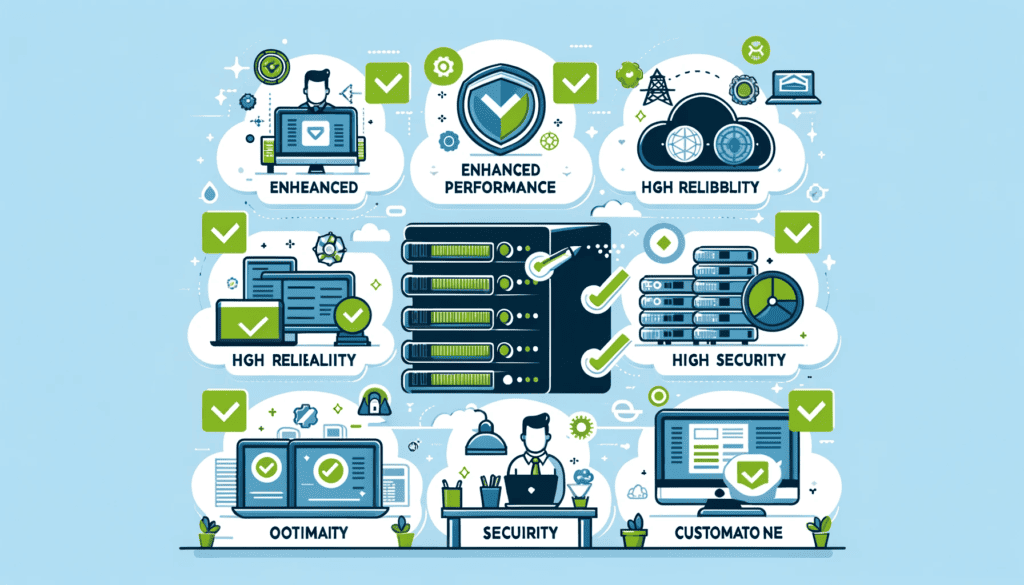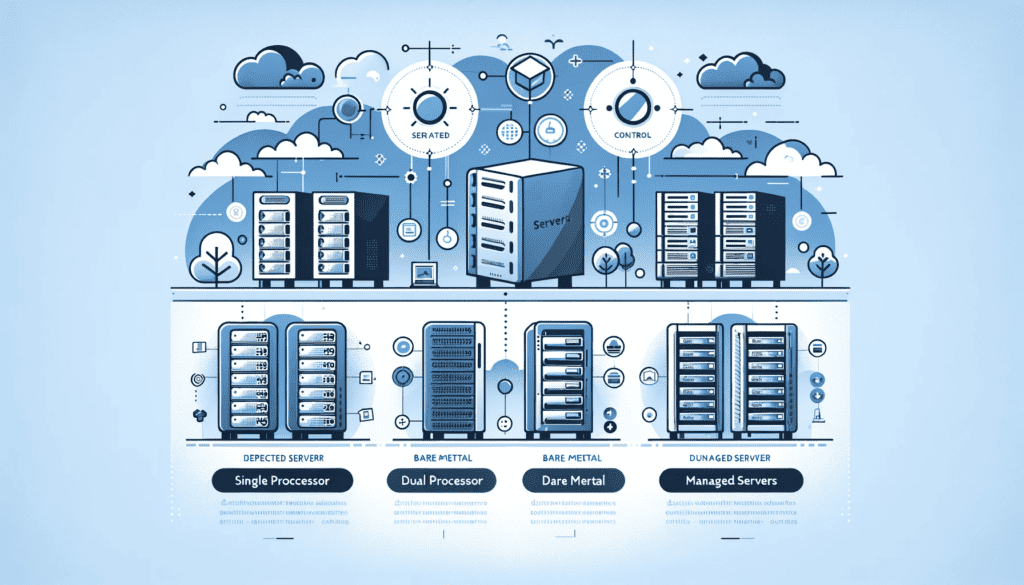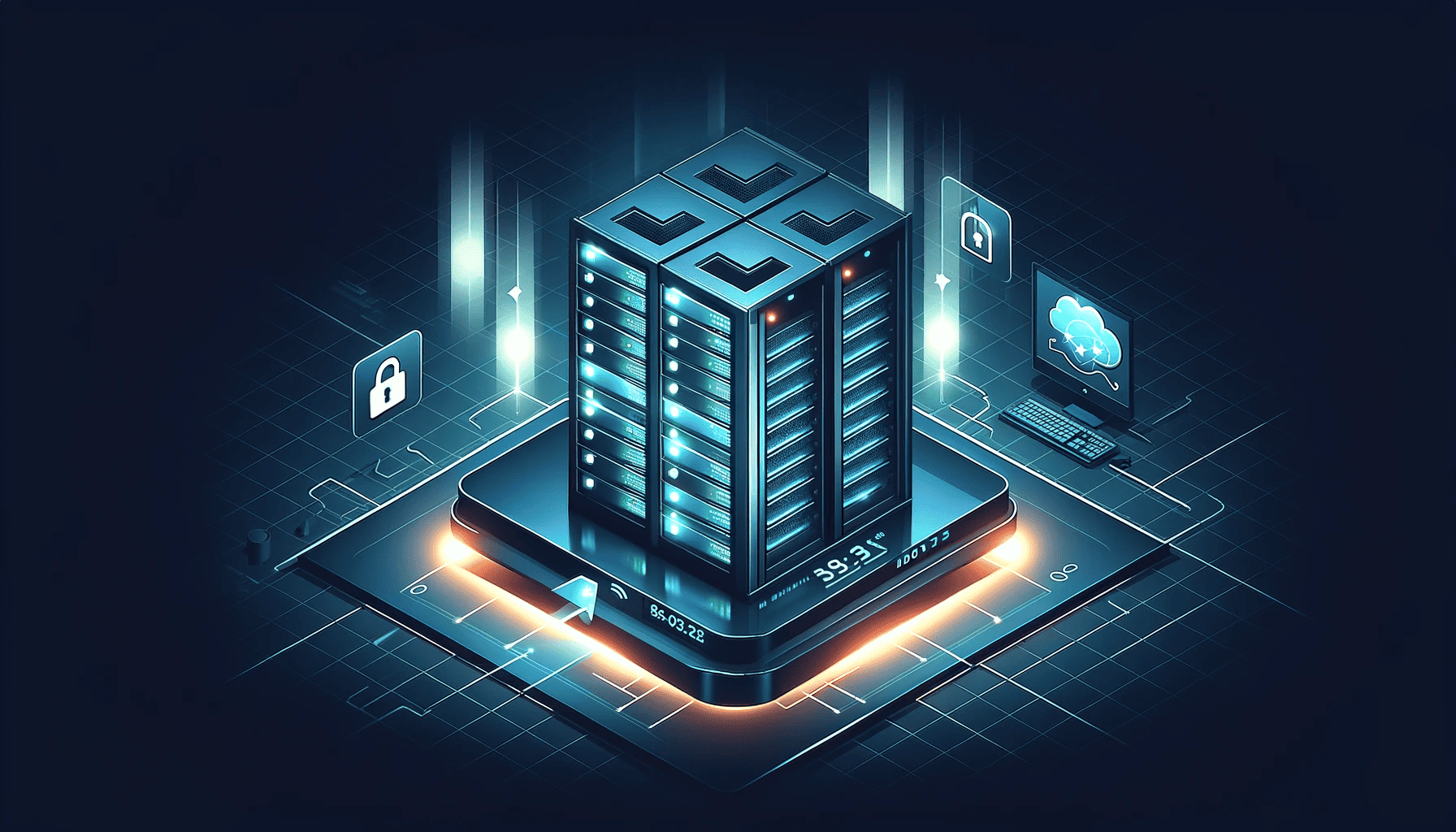Dedicated servers are a powerful hosting solution that provides businesses with complete control and ownership over a physical server. Unlike shared hosting, where multiple websites share server resources, a dedicated server is exclusively used by a single organization.
What is a dedicated server?
A dedicated server refers to a physical computer that is leased by an organization from a hosting provider. This server is solely dedicated to the needs of that specific organization and is not shared with any other users. It offers a higher level of performance, security, and customization options compared to other hosting options.
Dedicated servers are ideal for businesses that experience high website traffic, require reliable performance, need a high level of security, or have specific software and hardware requirements. With a dedicated server, businesses have full control over the server’s resources, such as CPU, RAM, storage, and bandwidth.
Benefits of using a dedicated server

- Enhanced Performance: Dedicated servers ensure optimal performance as all server resources are dedicated to a single organization. This translates into faster loading times, improved website responsiveness, and the ability to handle a high volume of traffic without any performance issues.
- Reliability and Stability: With a dedicated server, businesses can expect high uptime and availability. Since the server resources are not shared with other users, there is no risk of traffic spikes or resource-intensive applications impacting the performance of the website.
- Improved Security: Dedicated servers offer a higher level of security compared to shared hosting. Organizations have full control over the server’s security measures and can implement customized security configurations. This includes firewall installations, encryption protocols, and regular security updates.
- Flexibility and Customization: Dedicated servers provide businesses with the flexibility to customize server configurations based on their specific needs. They can install and run any software or operating system, scale resources as required, and have full root access to the server.
- Scalability: Dedicated servers offer scalability options to accommodate the growing needs of businesses. With a dedicated server, organizations can easily upgrade their resources, add more storage space, or increase bandwidth to meet the increasing demands of their website or applications.
- Full Control: A dedicated server gives businesses complete control over every aspect of their hosting environment. They can optimize server settings, manage security measures, and have the freedom to make any necessary changes without relying on the hosting provider’s restrictions.
Dedicated servers provide organizations with a robust hosting solution that guarantees enhanced performance, reliability, security, and customization options. With a dedicated server, businesses have full control over their hosting environment, allowing them to meet their unique requirements and ensure optimal website performance.
Types of Dedicated Servers

For businesses that require maximum performance, security, and control over their hosting environment, a dedicated server is an ideal solution. In this article, we will explore what a dedicated server is, the different types available, and the key features and specifications to consider when choosing one.
Different types of dedicated servers
- Single Processor Dedicated Server: This type of server is powered by a single processor, making it suitable for small to medium-sized businesses. It offers cost-effective performance and can handle most business applications.
- Dual Processor Dedicated Server: As the name suggests, this server comes with two processors, providing an extra boost in performance. It is ideal for businesses that require more processing power, such as data-intensive applications or high-traffic websites.
- Bare Metal Dedicated Server: A bare metal server is a physical server dedicated entirely to a single user or organization. It offers complete control over the hardware, allowing for customization and configuration based on specific requirements.
- Managed Dedicated Server: Managed servers are ideal for businesses that prefer to outsource server management. The hosting provider takes care of tasks such as server setup, maintenance, security, and updates, allowing businesses to focus on their core operations.
Features and specifications of dedicated servers
When choosing a dedicated server, there are several key features and specifications to consider:
- Processor: The processor determines the server’s processing power. Options range from entry-level processors suitable for basic applications to high-performance processors ideal for demanding workloads.
- RAM: Random Access Memory (RAM) affects the server’s ability to handle multiple tasks simultaneously. The more RAM a server has, the better it can handle complex applications and increased user traffic.
- Storage: Storage options include solid-state drives (SSD) and hard disk drives (HDD). SSDs offer faster read/write speeds, reducing loading times and improving overall server performance.
- Bandwidth: Bandwidth determines the amount of data that can be transferred between the server and its users. Higher bandwidth ensures faster website loading times and accommodates high levels of traffic.
- Operating System: Dedicated servers can be equipped with various operating systems, such as Windows, Linux, or CentOS. The choice depends on specific business requirements and compatibility with applications.
- Security: Dedicated servers provide enhanced security measures, including firewalls, DDoS protection, and regular security updates. These features help safeguard sensitive data and protect against cyber threats.
- Scalability: It is important to consider whether the dedicated server can be easily scaled up or down to accommodate changing business needs. Scalability ensures that the server can handle future growth without requiring a complete migration.
With the right type of dedicated server and the necessary features and specifications, businesses can enjoy optimized performance, increased security, and the flexibility to customize their hosting environment to suit their unique requirements.
Reasons to Use a Dedicated Server
When do you need a dedicated server?
As your business grows or your website experiences increased traffic and demands, you may find yourself in need of a dedicated server. But what exactly is a dedicated server and why would you need one?
A dedicated server is a type of web hosting where an entire server is dedicated solely to your website or business. This means you have full control over the server’s resources and can customize it to meet your specific needs. Unlike shared hosting, where multiple websites share the same server, a dedicated server offers higher performance and reliability.
You may need a dedicated server if:
- Your website experiences high traffic volume: If your website attracts a large number of visitors or handles complex transactions, a dedicated server can handle the increased load and ensure smooth performance.
- You require enhanced security: With a dedicated server, you have full control over security measures. This is crucial for businesses that handle sensitive customer data or financial transactions and need to comply with strict security regulations.
- You need complete control and customization: If you require specific software or configurations that are not available with shared hosting, a dedicated server allows you to fully customize the server environment to your exact specifications.
Advantages of dedicated server hosting
Using a dedicated server hosting solution offers several advantages over other hosting options:
- Enhanced performance: With a dedicated server, you don’t have to worry about other websites consuming the server’s resources, resulting in faster loading times and improved overall performance.
- Increased reliability and uptime: Since you are not sharing resources with other websites, you have full control over server maintenance, updates, and downtime. This means you can optimize server performance and minimize any potential disruptions.
- Advanced security measures: Dedicated servers provide a higher level of security compared to shared hosting. You have the ability to implement robust security protocols, firewalls, and encryption methods to protect your data and that of your customers.
- Scalability: With a dedicated server, you have the flexibility to scale your resources as your business grows. You can easily add more CPU power, RAM, storage, or bandwidth to accommodate increased traffic and demands.
- Customization: A dedicated server allows you to fully customize the hardware, software, and configurations to meet your unique needs. You have complete control over the server environment, giving you the freedom to install specific applications or software that are essential for your business.
In conclusion, a dedicated server offers increased performance, reliability, and security compared to shared hosting. It is ideal for businesses that require high traffic capacity, enhanced security measures, and full control over server resources and configurations. By choosing a dedicated server hosting solution, you can ensure optimal performance and scalability for your website or online business.
Choosing the Right Dedicated Server
When it comes to web hosting, one option that you might come across is a dedicated server. But what exactly is a dedicated server?
In simplest terms, a dedicated server refers to a physical server that is solely dedicated to hosting a single website or application. Unlike shared hosting where multiple websites are hosted on the same server, a dedicated server provides exclusive resources and control to a single user.
Factors to consider when selecting a dedicated server
Before diving into the benefits of a dedicated server, it is important to consider a few factors when selecting the right one for your needs:
- Performance: Dedicated servers offer high levels of performance and can handle heavy traffic loads without compromising on speed. When choosing a dedicated server, ensure that it can meet the performance requirements of your website or application.
- Scalability: As your business grows, your hosting needs may change. Look for a dedicated server that offers room for future scalability to accommodate your expanding requirements.
- Reliability: Uptime is critical for any website or application. Make sure you choose a dedicated server with a reliable infrastructure and network connectivity to minimize downtime.
- Security: With a dedicated server, you have more control over the security measures implemented. Look for features like firewalls, intrusion detection systems, and regular backups to safeguard your data.
- Support: Reliable and responsive technical support is essential when it comes to maintaining and troubleshooting your dedicated server. Check what type of support is offered by the hosting provider before making a decision.
Comparison between shared hosting and dedicated server hosting
Now that we have discussed the factors to consider, let’s compare dedicated server hosting with shared hosting.
Shared hosting involves multiple websites sharing resources on the same server. While this option is more affordable and suitable for smaller websites, it comes with limitations such as restricted resources and slower loading times due to increased competition for server resources.
On the other hand, a dedicated server offers numerous advantages over shared hosting:
- Performance: With a dedicated server, you have exclusive access to all the resources, resulting in faster website loading times and better performance.
- Security: Since you are the sole user of the server, you have a higher level of control over security. This reduces the risk of security breaches and improves data protection.
- Customization: A dedicated server provides you with the flexibility to customize the hardware and software configurations according to your specific requirements.
- Scalability: Dedicated servers are highly scalable, allowing you to upgrade resources as your website or application grows.
- Reliability: With a dedicated server, you have better control over uptime and can minimize downtime. This ensures a seamless user experience for your visitors.
While dedicated server hosting may come at a higher cost compared to shared hosting, it offers superior performance, scalability, security, and customization options.
In conclusion, a dedicated server is an excellent choice for businesses or individuals with high-performance requirements, security concerns, and scalability needs. By carefully considering the factors mentioned above and comparing them to shared hosting, you can make an informed decision when choosing the right hosting solution for your website or application.
Setting Up and Managing a Dedicated Server
For businesses or individuals with high-traffic websites or complex applications, a dedicated server can provide the necessary power and control. Unlike shared hosting, where resources are shared among multiple users, a dedicated server offers exclusive use of the entire server hardware and software. This ensures optimal performance, security, and flexibility for your online presence.
Steps to set up a dedicated server
- Choose a hosting provider: Research and select a reputable hosting provider that offers dedicated server solutions. Consider factors such as server specifications, data center location, technical support, and pricing.
- Select your server specifications: Determine your server requirements based on the nature of your website or application. Consider factors such as CPU, RAM, storage, bandwidth, and scalability options. Consult with your hosting provider to ensure you choose the right specifications for your needs.
- Install the operating system: Once the server is provisioned, you will need to choose and install the operating system. Popular choices include Linux distributions like CentOS or Ubuntu, or Windows Server editions.
- Configure your server: Set up the necessary network settings, security protocols, and software applications required for your specific needs. This may include web servers like Apache or Nginx, database systems like MySQL or PostgreSQL, and FTP services.
- Transfer your website or application: Migrate your existing website or application to the dedicated server. This involves transferring files, databases, and configurations. You may need to modify DNS settings or update IP addresses accordingly.
- Test and optimize: Ensure that your website or application is functioning as expected on the dedicated server. Run performance tests, check for any compatibility issues, and optimize server settings to achieve optimal speed and reliability.
Tips for managing and optimizing a dedicated server
- Regular monitoring: Keep an eye on server performance, resource usage, and security vulnerabilities. Utilize monitoring tools and set up alerts to address any issues promptly.
- Implement backups: Regularly backup your server data to prevent data loss in case of hardware failures, software issues, or human error.
- Stay updated: Keep the server and all installed software up to date with the latest security patches and updates. Regularly check for any vulnerabilities and apply appropriate fixes.
- Implement security measures: Secure the server by implementing a robust firewall, using strong passwords, enabling encryption, and limiting access to authorized individuals or IP addresses.
- Optimize performance: Fine-tune server settings, cache static content, enable compression, and implement content delivery networks (CDNs) to enhance website or application performance and reduce load times.
- Regular maintenance: Perform routine maintenance tasks such as disk defragmentation, database optimization, log file management, and resource cleanup to ensure optimal server performance.
- Utilize remote management tools: Take advantage of remote management tools provided by your hosting provider to simplify server administration and troubleshooting tasks.
By following these steps and implementing best practices, businesses and individuals can successfully set up and manage a dedicated server, ensuring maximum performance, security, and reliability for their online operations.



